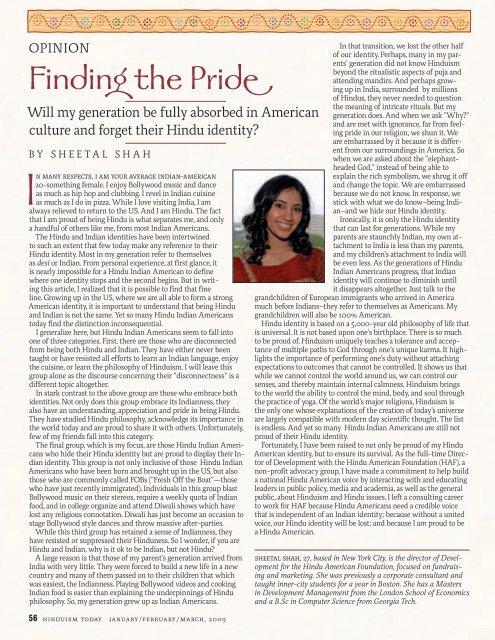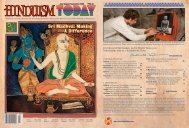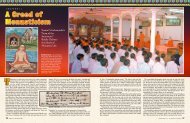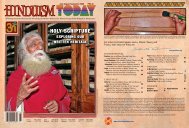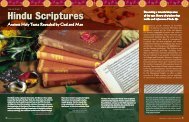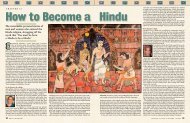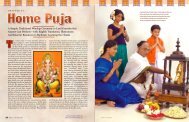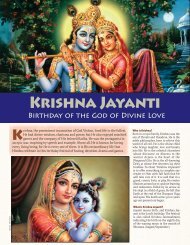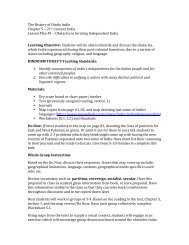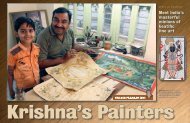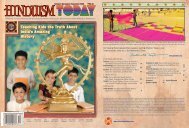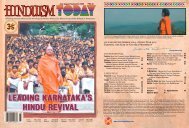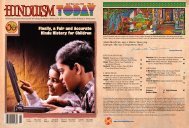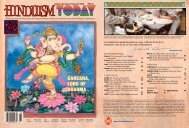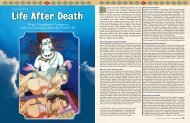Hinduism Today January 2009 - Cover, Index, Front Articles
Hinduism Today January 2009 - Cover, Index, Front Articles
Hinduism Today January 2009 - Cover, Index, Front Articles
You also want an ePaper? Increase the reach of your titles
YUMPU automatically turns print PDFs into web optimized ePapers that Google loves.
opinionFinding the PrideWill my generation be fully absorbed in Americanculture and forget their Hindu identity?by Sheetal shahIn many respects, i am your average indian-american20-something female. I enjoy Bollywood music and danceas much as hip hop and clubbing. I revel in Indian cuisineas much as I do in pizza. While I love visiting India, I amalways relieved to return to the US. And I am Hindu. The factthat I am proud of being Hindu is what separates me, and onlya handful of others like me, from most Indian Americans.The Hindu and Indian identities have been intertwinedto such an extent that few today make any reference to theirHindu identity. Most in my generation refer to themselvesas desi or Indian. From personal experience, at first glance, itis nearly impossible for a Hindu Indian American to definewhere one identity stops and the second begins. But in writingthis article, I realized that it is possible to find that fineline. Growing up in the US, where we are all able to form a strongAmerican identity, it is important to understand that being Hinduand Indian is not the same. Yet so many Hindu Indian Americanstoday find the distinction inconsequential.I generalize here, but Hindu Indian Americans seem to fall intoone of three categories. First, there are those who are disconnectedfrom being both Hindu and Indian. They have either never beentaught or have resisted all efforts to learn an Indian language, enjoythe cuisine, or learn the philosophy of <strong>Hinduism</strong>. I will leave thisgroup alone as the discourse concerning their “disconnectness” is adifferent topic altogether.In stark contrast to the above group are those who embrace bothidentities. Not only does this group embrace its Indianness, theyalso have an understanding, appreciation and pride in being Hindu.They have studied Hindu philosophy, acknowledge its importance inthe world today and are proud to share it with others. Unfortunately,few of my friends fall into this category.The final group, which is my focus, are those Hindu Indian Americanswho hide their Hindu identity but are proud to display their Indianidentity. This group is not only inclusive of those Hindu IndianAmericans who have been born and brought up in the US, but alsothose who are commonly called FOBs (“Fresh Off the Boat”—thosewho have just recently immigrated). Individuals in this group blastBollywood music on their stereos, require a weekly quota of Indianfood, and in college organize and attend Diwali shows which havelost any religious connotation. Diwali has just become an occasion tostage Bollywood style dances and throw massive after-parties.While this third group has retained a sense of Indianness, theyhave resisted or suppressed their Hinduness. So I wonder, if you areHindu and Indian, why is it ok to be Indian, but not Hindu?A large reason is that those of my parent’s generation arrived fromIndia with very little. They were forced to build a new life in a newcountry and many of them passed on to their children that whichwas easiest, the Indianness. Playing Bollywood videos and cookingIndian food is easier than explaining the underpinnings of Hinduphilosophy. So, my generation grew up as Indian Americans.56 hinduism today january/february/march, <strong>2009</strong>In that transition, we lost the other halfof our identity. Perhaps, many in my parents’generation did not know <strong>Hinduism</strong>beyond the ritualistic aspects of puja andattending mandirs. And perhaps growingup in India, surrounded by millionsof Hindus, they never needed to questionthe meaning of intricate rituals. But mygeneration does. And when we ask “Why?”and are met with ignorance, far from feelingpride in our religion, we shun it. Weare embarrassed by it because it is differentfrom our surroundings in America. Sowhen we are asked about the “elephantheadedGod,” instead of being able toexplain the rich symbolism, we shrug it offand change the topic. We are embarrassedbecause we do not know. In response, westick with what we do know–being Indian–andwe hide our Hindu identity.Ironically, it is only the Hindu identitythat can last for generations. While myparents are staunchly Indian, my own attachmentto India is less than my parents,and my children’s attachment to India willbe even less. As the generations of HinduIndian Americans progress, that Indianidentity will continue to diminish untilit disappears altogether. Just talk to thegrandchildren of European immigrants who arrived in Americamuch before Indians–they refer to themselves as Americans. Mygrandchildren will also be 100% American.Hindu identity is based on a 5,000-year old philosophy of life thatis universal. It is not based upon one’s birthplace. There is so muchto be proud of. <strong>Hinduism</strong> uniquely teaches a tolerance and acceptanceof multiple paths to God through one’s unique karma. It highlightsthe importance of performing one’s duty without attachingexpectations to outcomes that cannot be controlled. It shows us thatwhile we cannot control the world around us, we can control oursenses, and thereby maintain internal calmness. <strong>Hinduism</strong> bringsto the world the ability to control the mind, body, and soul throughthe practice of yoga. Of the world’s major religions, <strong>Hinduism</strong> isthe only one whose explanations of the creation of today’s universeare largely compatible with modern day scientific thought. The listis endless. And yet so many Hindu Indian Americans are still notproud of their Hindu identity.Fortunately, I have been raised to not only be proud of my HinduAmerican identity, but to ensure its survival. As the full-time Directorof Development with the Hindu American Foundation (HAF), anon-profit advocacy group, I have made a commitment to help builda national Hindu American voice by interacting with and educatingleaders in public policy, media and academia, as well as the generalpublic, about <strong>Hinduism</strong> and Hindu issues. I left a consulting careerto work for HAF because Hindu Americans need a credible voicethat is independent of an Indian identity; because without a unitedvoice, our Hindu identity will be lost; and because I am proud to bea Hindu American.sheetal shah, 27, based in New York City, is the director of Developmentfor the Hindu American Foundation, focused on fundraisingand marketing. She was previously a corporate consultant andtaught inner-city students for a year in Boston. She has a Mastersin Development Management from the London School of Economicsand a B.Sc in Computer Science from Georgia Tech.human rightsFacing Dalit IssuesWhat our Hindu Dalit brothers and sisters want iseconomic muscle and simple vocational respectby arvind chandrakantanAmerican-born hindus have very little exposureto the deep social problems faced by India’sDalit and Harijan communities, who comprise25% of our Hindu family. But time and again weface burning allegations of caste discrimination within<strong>Hinduism</strong>. Scriptural documentation of caste in <strong>Hinduism</strong> issparse. Most interpretations of caste come from proselytizingWestern Christian missionaries. In fact, the origin of thecaste supposedly from the four parts of Purusha, the CosmicMan, can be seen in another light. If Purusha represents thetranscendental nature of consciousness, then the brahminis he who lives eternally in Brahman (enlightened state), thekshatriya is he who fights the practical nature of the dualityof the mind, the vaishya is he who teeters towards thetamasic side of the mind but exists in the rajasic state, and the sudrais he who exists in the tamasic state. So before we label one of ourHindu brethren with a caste name, we should delineate our own.Myself and my friend Eswaran wanted to learn about the issues firsthand. Here is our interview with Dalit leader, Sri Kalidoss Swamigal,done during our summer 2008 trip to India. He elucidates the pivotalkeys needed for change.What is the form of discrimination faced by Dalit people?First, the concept of “Dalit” is found not just in the Hindu community.All religions, communities and races have had this throughouthistory. To think of it as a Hindu issue isa false concept. Poverty is our primaryproblem. Our children are unable tobenefit from reservations (affirmativeactions programs) because they areforced into the work force very early.Reservations for colleges and jobs don’thelp if you don’t even have enoughfood or water. Until basic amenitiesare met, reservations can do only somuch. Many in our community havedone well having those amenities. But,we are 25% of the Hindu population,yet we are still under-represented inSri Kalidoss Swamigal several areas because so many of ourreservations go unfilled each year.At a religious level, we often see money flow in from Christianand Muslim organizations overseas to help Dalits, but not fromHindu organizations. This leads many of our community to feel thatHindus do not care about them. The end of casteism would end alot of problems faced by our community, but it would not help usovercome poverty. If a man has food, water and basic necessities,then he can focus on education and upliftment. Education is thepanacea to many problems for all communities, not just for ours. Somany bright young Dalit boys and girlsare unable to fulfill their educational goalseach year because they are pushed into theworkforce at a young age to help providefor their families.How did the Dalit community cometo be? One third of the ancient SaiviteTamil saints were from Dalits.In ancient times, the caste system was notso stratified. This allowed several membersof the so-called “lower” communities tocome up. This is well recognized in religioustexts from all over India, not only inTamil classics. Caste classifications becamefixed only later.What is <strong>Hinduism</strong> to your community?<strong>Hinduism</strong> means a lot to our community.Even if people get converted to eitherChristianity or Islam, it is foreign. You cango to church or mosque for two or threedays, but you grew up with Lord Siva,Ganapati and Murugan. So we cannot denythis. Hence many reconvert to <strong>Hinduism</strong>.Other religions also do not have a trackrecord of treating Dalits well, which isanother reason for reconversion.What is the religious practice within your community? Do youhave your own temples and priesthood?Our practices are no different than any other Hindus. We eat andpray like other Hindus, and our festivals are the same also. Thereis no subcastes of priesthoods in the Dalit community, and, in fact,there are minimal subdivisions within our community.How do you see “untouchability” or impure vocations?There are jobs that the Dalit community do that other Hinduswould not do. But to label our jobs as ritually impure is unfair. Evenif we clean the temple floor, is this not a service to God? Manypeople in our community do not resent the work unless it is seen byother Hindus as being a “Dalit” job. These labels create resentment.What should the Dalit community do to improve its status?Many Dalits have been very successful over the years, but they don’thelp other Dalits to come up.Why are Dalits converted to Christianity and then somereconverting back to <strong>Hinduism</strong>?Dalits see Christians coming to help them, and they help to propagatethe misconception that Hindus do not care about them. Bothare untrue. Dalits who have converted to other religions have notbenefitted in any way, and many have converted back to <strong>Hinduism</strong>in recent years. If you are to struggle, why not struggle with yourown religion that you grew up with?contact: a l l i n d i a da l i t h i n d u m a a k a l a a n m e g a s a ng a m , s a n k r a l aya ,6 3 m ayor r a m a nat ha n s a l a i , c h e t p e t, c h e n na i , i n d i a 6 0 0 0 3 1 .h e a d o f t h e s a ng a m , s r i k a l i d o s s s wa m i g a l ( i n t e rv i e w a b ov e ) has b e e nnominated for the shri narayana guru award for outstanding leadersh i p i n s o c i a l r e for m g i v e n t h e t h e h i n d u a m e r i c a n fo u n dat i on a n dg l o b a l h u m a n r i g h ts d e f e nc e for o u ts ta n d i ng wor k t o u p l i f t da l i ts .visit: http://www.hafsite.org/harijan_award.htmarvind chandrakantan, md, 31, (photo at top) is a physician inMiami who works with the Hindu American Foundation and theLoka Dharma Seva Foundation and Trust.january/february/march, <strong>2009</strong> hinduism today 57


